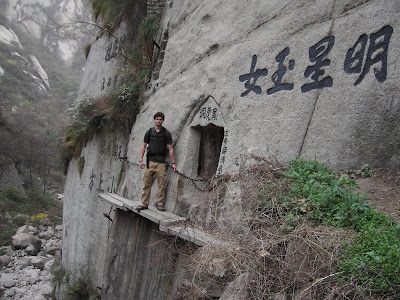The least expensive train ticket from Beijing to Xi'an costs a little over one-hundred renminbi, the U.S. equivalent of $20. The sales agent explains that it is a “hard sleeper” ticket – an economy class reservation that should include a small space to sleep but virtually no privacy for the duration of the twelve-hour overnight. Arriving at the platform, I discover that a “hard sleeper” is simply a stiff-backed bench seat that can cram between three and five people per row. The train departs Beijing-West station at nine in the evening, and after clacking through a series of beat-looking depots it picks up speed and as the city lights fade my window resolves itself to a dark mirror. After several hours many couples are sprawled haphazardly across the tables and benches, and the floors are littered with crunched shells, playing cards and empty buckets of instant-noodle. I decide to stretch out in the aisle next to another man who is already fast asleep, while people walking through the train have to clumsily avoid stepping on the tangled network of arms and legs that fill the cabin. I shut my eyes tight, resting my head on my bag and trying to block the sour musk of feet and open food-wrappers and eventually I nod off to the steady rock and whistle of the train.
A few hours later I get up, carefully stretching as to avoid hitting anyone else. Looking out the window, the landscape begins to reveal itself in the pre-dawn, and for a moment I am struck, as though being reminded of sitting in some theater at the end of a long performance, just as the houselights come up. We have passed the boundary into Shaanxi province – coal country – so called for the numerous refineries and mines that dot the cliffs and valleys, these rusted instruments of industry that stand motionless in the smoky twilight.
Line T-27 will continue on through the western provinces, passing Golmud and Qinghai, eventually arriving at the rail's terminus in Lhasa, Tibet. For now though, I exit at the south-central city of Xi'an, the first capital city of China, unified under the Qin empire in 217 B.C, and famous today as the site of the terracotta warrior army.

The Great Mosque, Xi'an
 Longmen caves, Luoyang
Longmen caves, Luoyang Hiking Hua Shan
Hiking Hua Shan The terracotta army.
The terracotta army. Xi'an by night.
Xi'an by night.

No comments:
Post a Comment